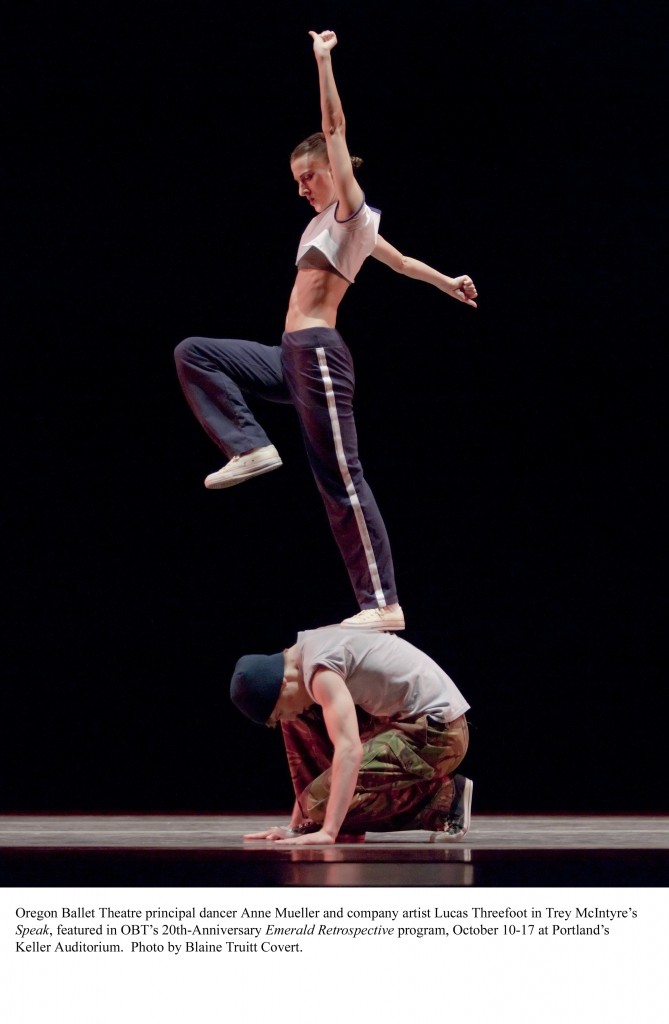
“Did you notice how the first lady soloist started dancing just with her hands?”
Intermission had just begun Saturday night at Oregon Ballet Theatre‘s season-opening performance, which had so far consisted of the company premiere of George Balanchine’s green dream of a dance, Emeralds. Mrs. Scatter had scarpered to the coast for one of her intermittent weekends of popping corks and doing crafty stuff with her girlfriends, and Mr. Scatter was in the company of the Small Large Smelly Boy, two weeks shy of his twelfth birthday and taking in his first non-Nutcracker ballet.
“No, Dad,” the SLSB replied patiently. “It was her whole arms.”
So it was.
Those arms belonged to the highly talented Yuka Iino, the fleet princess in this picture-book of a ballet to Alison Roper’s imperial queen.
Premiered in 1967 and seeming older than that (this is definitely a pre-Beatles universe onstage) Balanchine’s ballet is a visual stunner: Karinska’s glittering emerald costumes; the spare vivid set with its falling sweep of white drapery and its lone elegant chandelier high above the stage; the astonishing lighting (originally by Ronald Bates, executed here by OBT’s masterful designer Michael Mazzola) that reminds me somehow of C.S. Lewis’s Narnia series, with its conceit that there are old worlds and new worlds, and that in the new ones everything is brighter, more vivid, more cleanly outlined, and the air seems alive.
But the SLSB, freshly showered for the occasion, isn’t looking at the set. He’s looking at feet. This boy is an observer (and, I think, more a classicist than a postmodernist), and he’s captivated by something that’s captivated millions of people for almost two hundred years: toe work.
 “How do they dance up on their toes like that?” he asked. “Do they have to work a lot to do it? That must be hard!”
“How do they dance up on their toes like that?” he asked. “Do they have to work a lot to do it? That must be hard!”
“Yes,” I replied. “That’s called dancing en pointe. It’s very hard. You have to practice for years and years. Even professional dancers keep practicing it, all the time. Dancers are athletes, did you know that? They have to be as athletic as anybody in a sport, plus they have to be artists.”
“How do they know what to do?”
“Well, the dancemaker, the choreographer, decides on how they’ll move to the music. There are five basic positions that your feet and legs can take, and then there’s lots of variations and different ways you can combine them. But it all starts with those five positions you need to learn. And you work on those all the time.”
I was afraid the SLSB might be bored by Emeralds. It’s hardly the cutting edge of contemporary ballet, after all, and although I love Gabriel Faure’s music, it can be deep and reserved. Perkiness is not its game.
I shouldn’t have worried. My son’s attention was perfectly focused through this long dance, absorbing it, homing in on particulars. He caught the importance of the shoes in absorbing the impact of the weight and pressure on those elevated feet. (Later, watching Dennis Spaight’s fluid and sassy Ellington Suite, he was also impressed that the dancers can dance in high heels.)
The second act of this expansive evening of dance consisted of 10 shorter pieces, in whole or in excerpt, from the company’s history — including one, a scene from The Sleeping Beauty, performed by the young dancers of the company school. This is OBT’s twentieth anniversary season, and it kicked off with a celebration of the company’s past, although with a gaping hole: For reasons that I don’t understand (I know he was asked) the program includes no dances by James Canfield, artistic director for the company’s first fourteen years.
Continue reading Lithe Talented Dancers wow Large Smelly Boy